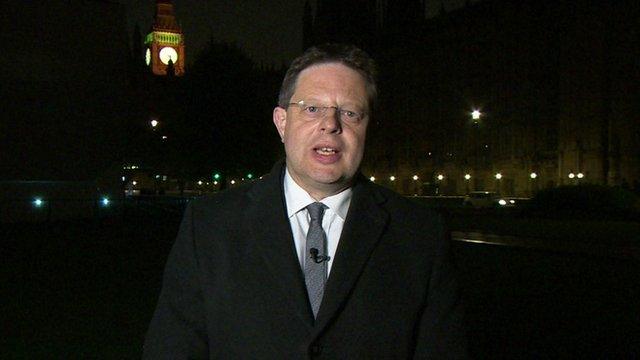Will Berlin's brake on rents be good for Germany?
- Published
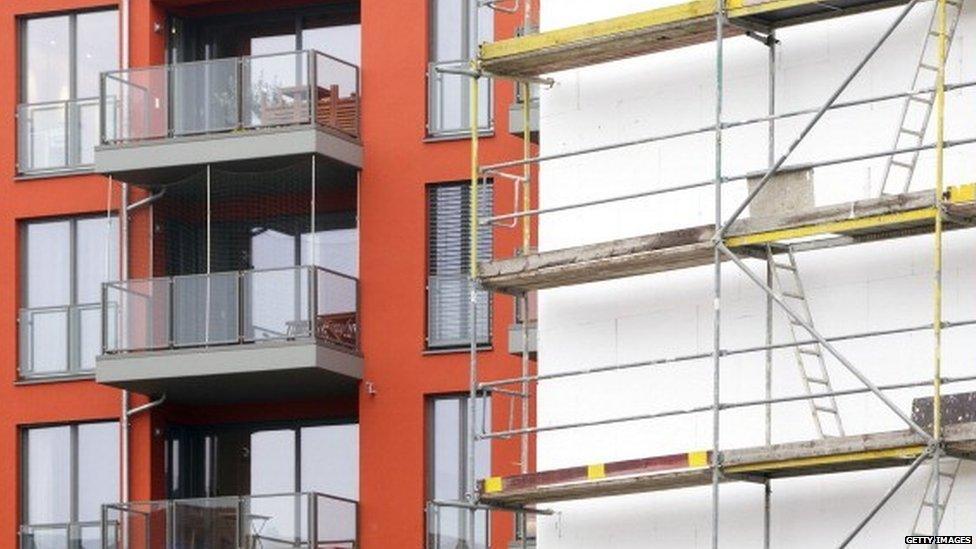
Many say the only real long-term solution to rising rents is to build more flats
Germany has introduced a controversial law to cap rents, called a "rent brake". But there are fears that it may fail in its main aim of slowing down price rises and ultimately have the opposite effect.
Until 1989, the area near Berlin's Hauptbahnhof (central station) was known as the death strip, where the Berlin Wall once divided communist East Berlin from the capitalist West.
Today it is a property hotspot. It is hard to believe that just over two-and-half decades ago you could have been shot for standing where people are now eating ice-cream.
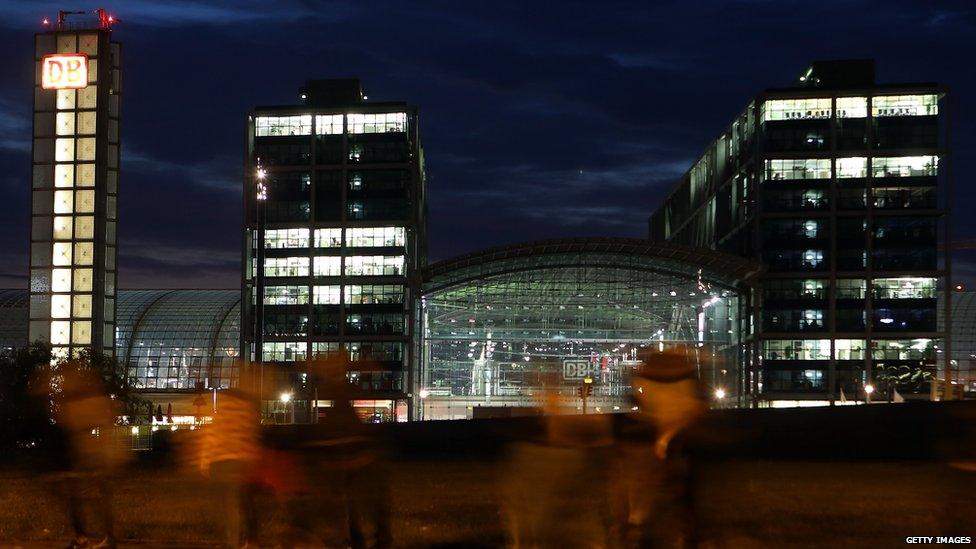
The central station opened in 2006 across the canal from the old Berlin Wall
A canal boat drifts by, filled with contented-looking middle-aged Germans drinking huge beers, while chatting cyclists rattle past on the picturesque cobble-stoned towpath.
Nowadays, the area's gruesome past is a sexy selling point for estate agents to drum up interest: crumbling concrete watchtowers dwarfed by gleaming, glass-fronted apartment buildings.
Growing Berlin
"It's hard to get a flat in the centre for a normal price," says Florian, a 27-year-old chemical engineer, who has been looking for a new home since May.
We've come to this area near Berlin's Hauptbahnhof to see where Florian recently viewed his dream flat, a small studio for €550 ($625; £400) a month with bills.
A few years ago someone like Florian, with a decent permanent job, would have found a flat in Berlin easily. But the city is growing by about 50,000 people a year.

Most Berliners are eager to avoid property in the centre of their city becoming unaffordable
Suddenly, a city renowned for the bohemian lifestyle that comes with cheap housing is seeing average rents rising by 10% a year - making it harder for local people like Florian to find affordable housing.
That it a big problem in a city where 55% of households have a net monthly income of less than €1,500.
So, in June, the government introduced a new law capping rents, meaning that landlords cannot charge more than 10% above a local average set by the authorities.
The move is popular with Berliners, around half of whom rent. And it is now being rolled out in other areas of Germany.
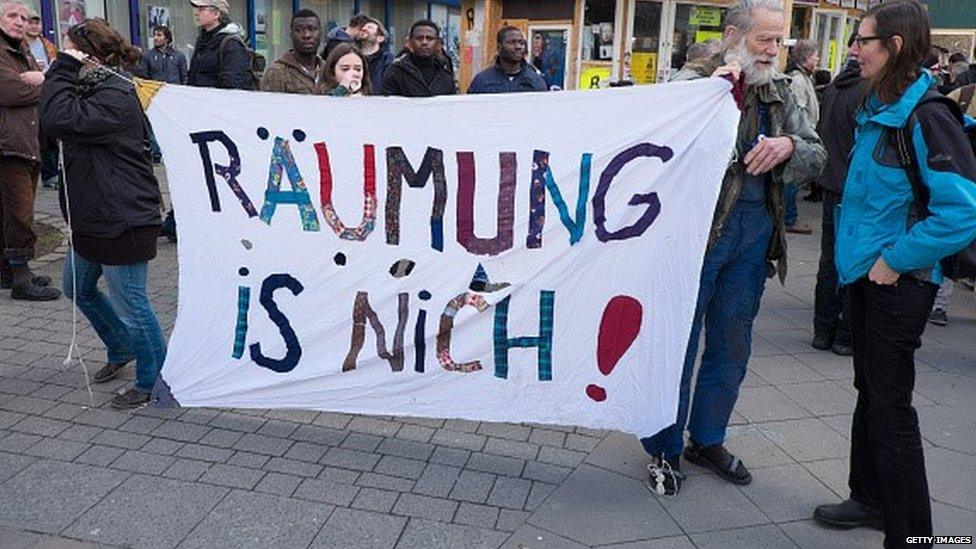
"No to evictions" - anti-rent rise protests led to the new rent control laws
And it appears to be working, says Jan Hebecker, data analyst at Germany's largest online property portal Immobilienscout24.
In June alone, the first month after the law came into effect, Berlin rents fell by 3%.
Social mix
"In some areas you really need that: for example in Munich, where people are not able to pay those prices. There you have a Paris or London effect where nobody lives close to the city centre. We don't want that in Germany," says Mr Hebecker.
According to Wibke Werner, from Berlin's tenant association, the law is popular because Germans see how unaffordable renting has become in other Western cities.
"London shows what happens if you don't find a legal way to cap rents. It gets more and more expensive so that in the end only rich people can live in the centre of the city. But maybe we'll have a chance to save the social mix."
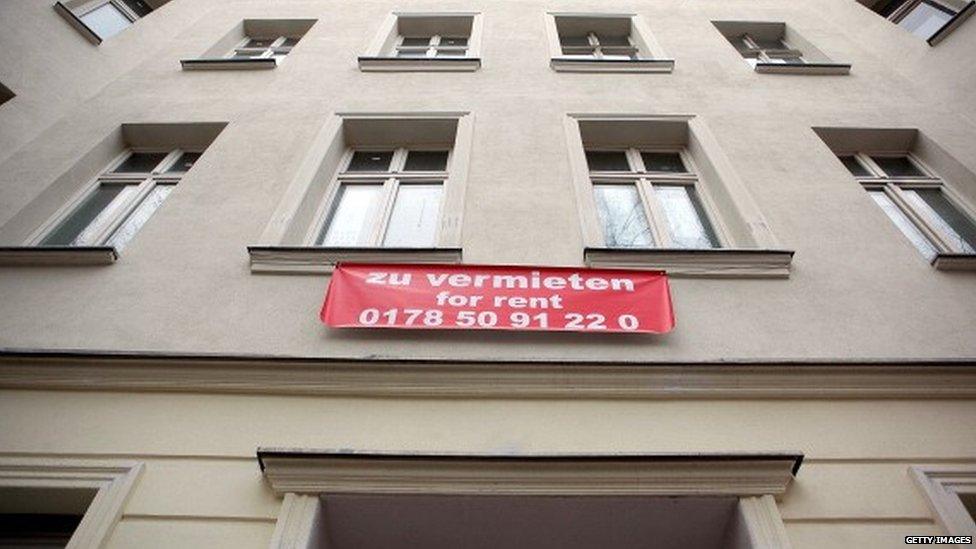
Although rents have fallen in Berlin, tenants have begun waiving their right of appeal against high rent
But lawyer Carsten Bruekner disagrees.
He runs an organisation for property owners, Haus und Grund, and says that the law makes renting out flats financially unviable.
Owners will simply sell rather then rent out flats, so in the long term the law could lead to less rental accommodation on the market.
Small investors will be hit hardest, he argues, because the legal level set by local authorities is below market value, and often much less than the mortgage that an individual buy-to-let investor may have taken on.
Florian was unable to get the flat he wanted despite, or maybe even because of, the new rent controls.
When he mentioned to the landlord that the rent was almost 20% above the legal limit he was suddenly told the flat was no longer available.
That is because, although rents are capped, tenants can waive their new rights and accept a higher rent. And that is what is happening.
As a result many say that there is only one real long-term solution to rising rents: to build more flats.
- Published5 November 2014

- Published9 November 2014

- Published25 April 2015
